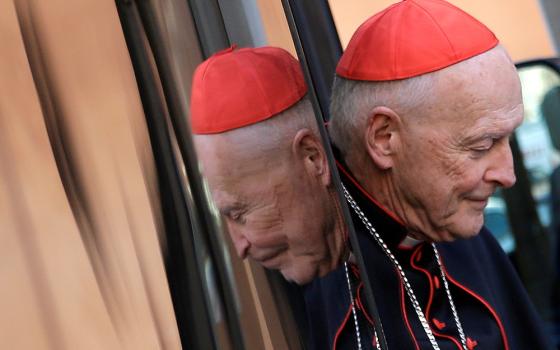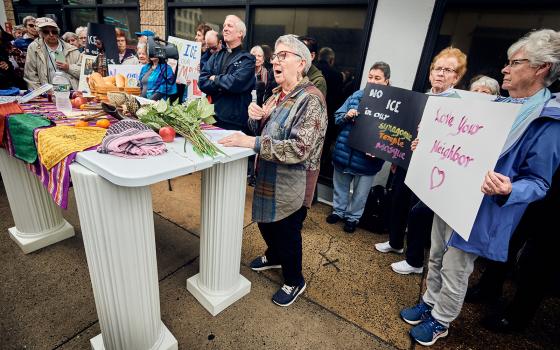Today's first reading from Isaiah and the Gospel from Mark are excellent examples of the effectiveness of God's word to realize what it announces.
For his part, the prophet served as God's mouthpiece, encouraging the people to be stronger than their fears because God -- who sees all, knows all and cares for all -- is coming to save! That promised salvation will be marked by an end of physical debilities so that all may hear, see and understand the salvific gifts of God and break out into joyful, grateful praise.

| Twenty-third Sunday in Ordinary Time |
| Isaiah 35:4-7a Psalm 146 James 2:1-5 Mark 7:31-37 |
What Isaiah promised, Mark pronounced as fulfilled in Jesus' action of healing the deaf one who had a speech impediment. Jesus would also give sight to the blind and cure the lame, all in an effort to illustrate the potency of God's word and power at work in him, inviting to faith and conversion all those who witnessed his actions.
William Barclay has pointed out that Jesus' treatment of the deaf man was marked by a tender kindness ("The Gospel of Mark," The Daily Study Bible, The Saint Andrew Press, 1976). Instead of subjecting the man to further embarrassment by underscoring the difficulty of his situation, Jesus took the man "off by himself, away from the crowd."
There, Jesus touched the man and prayed, and, immediately, the man heard and spoke plainly. (No doubt Jesus also chose a private place in which to temper the excitement of those who wanted to make him king on the basis of the wonders he worked. These had yet to appreciate the true character of Jesus' authority.)
Because the sacred texts are living words that continue to have meaning for all generations of believers, we can well imagine ourselves in the place of the deaf man (or the blind or the lame or the fettered) being ministered to by Jesus.
Jesus is eager to lead us "off by ourselves and away from the crowd," if only we allow him. There, in quiet intimacy, he invites us to show him our deepest wound, our greatest need, our most shameful sin. When we dare to do so, we are met with no reproach, no condescension, no impatience.
On the contrary, we are welcomed with love, tended with prayer and patience and either healed or made stronger for the burden that is ours to bear. As Jesus has thus ministered to us, we are called to do likewise for one another.
At the time of this writing, the media is reporting on the situation of an 81-year-old veteran who was recently released from the hospital after months of cancer treatments. When he arrived home, he found himself completely alone, confined to his chair and without a scrap of food to eat. At a loss for what to do, he called 911. Moved by the aging man's plight, the dispatcher who took his call saw to it herself that his fridge was restocked.
When the story circulated on social media, many praised the dispatcher's efforts and expressed sympathy for the old vet. Several said, "If only he lived nearer, I'd be glad to help" or "Shouldn't the VA be taking care of him?"
Well, the simple fact remains that needs such as this elderly gentleman's are everywhere, and we need not look far to find someone to whom we can minister as Jesus has ministered to us. It does no good to cast blame or try to pin responsibility on someone else. The needs of the needy and the cries of the poor enunciate the agenda of those who belong to Jesus.
Moreover, the manner in which Jesus ministered to people has set the bar for all who minister in his name. Very much aware of the dignity of others, Jesus treated them as beloved brothers and sisters. He did not judge them by their outward appearances or by the wealth they had managed to amass.
In each of the second readings for September, the Letter of James will draw our attention to the church's preferential option for the poor and keep us ever mindful that good words and good intentions are to be translated into good works. In today's excerpt from his letter, James urges, "Show no partiality."
This may remind readers of Peter's speech in Acts 10, where he said, "I begin to see that God shows no partiality." Seeing others as God sees them is one of the great challenges of the faith.
Jesus goes on to say that God saw the poor and chose them to be rich in faith and heirs of the kingdom. It follows then that the poor, the deaf, the blind and the lame are God's royalty, and that we should see it as our privilege to minister to them. In them, we find God; in them, we tend to the needs of the body of Christ.
Were it not for them, we would not be who we are -- disciples of Jesus, who takes us off by ourselves and away from the crowd to tend to us, so that we can tend to others.
[Patricia Sánchez holds a master's degree in literature and religion of the Bible from a joint degree program at Columbia University and Union Theological Seminary in New York.]



